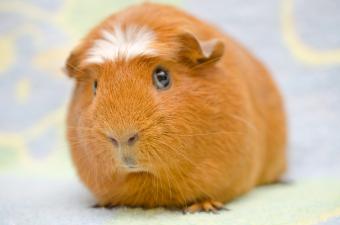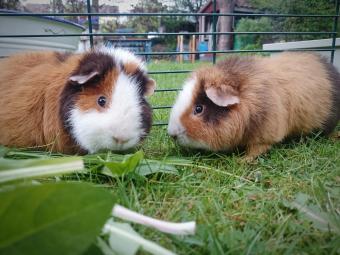
Guinea pigs are very smart and curious creatures. They're also social animals and enjoy spending time with their owners, making them good pets for children. However, they do require some extra care and attention to keep them happy and healthy.
How Smart Are Guinea Pigs?
Although Guinea pigs may not be as well-known for their intelligence like some other animals, such as rats, Guinea pigs exhibit behaviors that demonstrate their level of intelligence. For example:
-
Social skills: Guinea pigs are social animals that thrive in groups, both in captivity and in the wild. They can recognize and form bonds with other Guinea pigs as well as their human companions. They communicate using a variety of vocalizations, each with its own unique meaning, to express their emotions.
-
Learning abilities: Guinea pigs can learn to associate specific sounds, sights, or actions with positive or negative experiences. For example, they may recognize the sound of a treat bag or the appearance of their owner, as they're waiting for food or attention.
-
Problem-solving: While Guinea pigs are not typically known for their problem-solving skills, they can learn how to go through mazes, find hidden food, or overcome obstacles when motivated by a reward, like those within a treat puzzle. Their problem-solving abilities don't seem to be as advanced as those of rats or other more intelligent animals, but they still have some cognitive ability to solve problems when they are motivated.
-
Memory: Guinea pigs have a decent memory that allows them to remember routines, familiar objects, and even people. They can also recall the location of their food or water sources, which are essential for their survival in the wild.
-
Training: With patience and positive reinforcement, Guinea pigs can be trained to perform simple tricks, like coming when called.
Do They Communicate With Humans?
Guinea pigs have different ways of communicating with each other, but they also have some special ways of communicating with humans. If your Guinea pig is happy, they will make a high-pitched squeak that sounds like a bird. If they're unhappy or frightened, their vocalization may sound more like a cat's hiss. If your Guinea pig wants something from you, they may grunt or squeak in a low pitch sound that sounds somewhat like purring.
Guinea Pigs Need Socialization

Guinea pigs are social animals, so it's important to provide them with plenty of time with their human families. They need stimulation to keep mentally fit and healthy. Cavies love being held, stroked, and cuddled by their owners. A Guinea pig that is handled daily when young will learn to enjoy this type of interaction throughout their life.
Guinea pigs need socialization, just like any other pet. If your Guinea pig doesn't receive enough socialization, they will become depressed and unhappy. It will also be more difficult to train a Guinea pig that has not received adequate socialization. To help prevent this from happening, it is important that you provide plenty of opportunities for your Guinea pig to interact with other Guinea pigs and humans.
Guinea Pig Empathy
Studies have shown that cavies are capable of recognizing and responding to the emotions of other Guinea pigs, as well as humans. For example, Guinea pigs have been observed to show signs of distress when hearing the cries of other Guinea pigs in pain, and they also respond to their owners' voices and body language. They also show signs of distress when separated from their cage mates or humans they have bonded with.
Do Guinea Pigs Recognize Each Other and Their People?

Like many animals, Guinea pigs primarily rely on their sense of smell for recognition. They can recognize the scent of other Guinea pigs and familiar humans, which helps them identify members of their social group.
Guinea pigs also have relatively good vision and can recognize generalized visual cues, such as the shape, size, and color of other Guinea pigs and their human caretakers. They may not be able to distinguish the differences between facial features as well as some other animals, but they can learn to associate their owner's appearance with care and attention over time.
Domesticated Guinea pigs appear to have greater cognitive spatial awareness than wild Guinea pigs.
Why Cavies Need Enrichment
Guinea pigs are highly social animals and require regular interaction. If you keep two together, you can slightly reduce the amount of interaction you have with them. However, you will still need to provide your cavy with time outside their cage - at least one hour each day - interacting with you or others. Guinea pigs need mental stimulation to stay healthy and happy. Positive interactions with their family, such as petting and playing, are important forms of enrichment.
Get to Know Your Cavy's Intelligence Level
Although Guinea pigs aren't known to be as intelligent as some other species, especially rats, they still require a significant amount of interaction with others. By spending time interacting with your Guinea pig and providing consistent care and positive experiences, you can strengthen the bond with your pet and increase their ability to recognize you as their caretaker.






